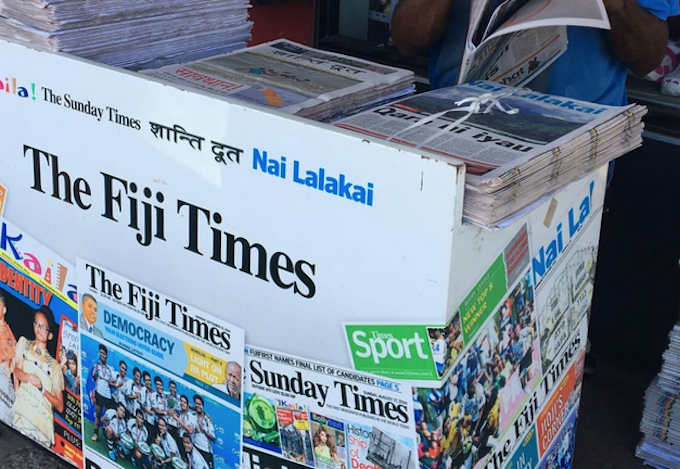
By Kelvin Anthony, RNZ Pacific lead digital and social media journalist
The Fiji government has announced it will repeal the controversial Media Industry Development Act 2010.
Prime Minister Sitiveni Rabuka said cabinet had approved the tabling of a bill to repeal the Act “as a whole.”
“The decision is pursuant to the People’s Coalition Government’s commitment to the growth and development of a strong and independent news media in the country,” said Rabuka in his post-cabinet meeting update.
“It has been said that ‘media freedom and freedom of expression is the oxygen of democracy’,” he said.
“These fundamental freedoms are integral to enable the people to hold their government accountable.
“I am proud to stand here today to make this announcement, which was key to our electoral platform, and a demand that I heard echoed in all parts of the country that I visited,” he added.
The announcement comes just days after Rabuka’s government introduced a new draft legislation to replace the act.
Strongly opposed
The move to replace the 2010 media law with a new one was strongly opposed during public consultations by local journalists and media organisations.
They said there was no need for new legislation to control the media and called for a “total repeal” of the existing regulation.
The country’s Deputy Prime Minister, Manoa Kamikamica, told RNZ Pacific last Friday that there were areas of concern that local stakeholders had raised during the consultation session of the proposed new bill.
“We hear what the industry is saying, we will make some assessments and then make a final decision,” he said.
But Rabuka’s announcement today means that the decision has been made.
RNZ Pacific has contacted the Fijian Media Association for comment.
‘Good decision’ but investment needed
University of the South Pacific head of journalism programme Associate Professor Shailendra Singh said the announcement was expected.
Dr Singh said repealing the punitive legislation was a core election platform promise of the three challenger parties which are now in power.
“This is a good decision because the Fijian media and other stakeholders were not sufficiently consulted when the decree was promulgated in June 2010.”
But he said while getting rid of the media act was welcomed, the coalition was working on a new legislation and “we have to wait and see what that looks like”.
“The media act was dead in the water or redundant before the change in government. The new government could not have implemented it after coming to power, having criticised it and campaigned against it in their election campaign,” he said.
“Repealing the act removes the fear factor prevalent in the sector for nearly 13 years now.”
Dr Singh said the government had committed to the growth and development of a strong news media.
Public good investment
But that, he said, would require more than the repeal of the act.
“[Improving standards] will require some financial investments by the state since media organisations are struggling financially due to the digital disruption followed by covid.”
He said among the many challenges, the media industry was struggling to retain staff.
“So incentives like government scholarships specifically in the media sector could be one way of helping out.
“Media is a public good and like any public good government should invest in it for the benefit of the public.”
This article is republished under a community partnership agreement with RNZ.













































